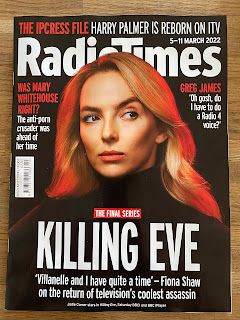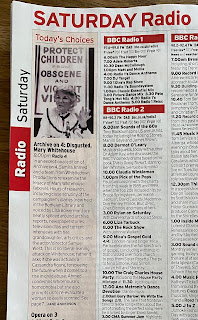To quote my wise chum
Toby Hadoke, “Who needs facts when you've got an opinion?”
First,
in the Independent, Gerard Gilbert slags off the forthcoming new series of Doctor Who without having seen it. He admires Russell T Davies – who is not involved in the forthcoming series – “not least in resisting what you might call a glossy Americanisation of the property, and in retaining the show's essential, and very British, spirit”, but then decides Doctor Who would be better were it, er, more like a glossy American TV show called Caprica.
“Caprica delves into some pretty meaty themes, from religion and racism to terrorism and what it means to be human, while it directly addresses current developments with the internet and its virtual worlds. It's light years more ambitious in scope than Doctor Who, and it's still not too late to catch.”
Except, recent Doctor Who – a fun family show as opposed to a
tediously dour one for tediously dour grown-ups – has also covered religion (the faith of people in Gridlock, the Doctor meeting the devil in The Satan Pit), racism (in the experiences of Martha Jones, but also in the way humanity treats aliens), terrorism (from the Slitheen attack on London to the Government deciding which children to give to the aliens in Torchwood: Children of Earth), what it means to be human (all of Season 3, especially Human Nature / Family of Blood) and the future of the internet (come on, the Doctor Who did that in 1966).
The article is petty, lazy and factually wrong. The comments that follow it afford the usual edifying spectacle of the public speaking their brains, but include a
beautifully polite reply from Doctor Who's producer Piers Wenger.
Second, the Dr took me to see
The Girl With The Dragon Tattoo this afternoon. She'd read the book (and is on to book three now) but I have not. So obviously I'm now qualified to lecture on both.
No, that would be ridiculous wouldn't it? So I'm baffled by
Viv Groskop's blog for the Guardian (an edited version also appeared in print in the Review section yesterday). Groskop admits avoiding the book to begin with because of the hype.
“I imagined clichés and extreme violence. I was pleasantly surprised, then, to discover it is neither formulaic nor disturbingly graphic. And it was indeed Larsson's take on feminism that made it stand out as an original read.”
So she liked it, then? But Groskop goes on to quote from a number of reviewers who found the book sexist or misogynistic – though, note, that's not the view Groskop herself had of the book. She then says the film, which she has not seen, has been “universally panned”, and quotes criticisms of “Larsson's misogynistic fantasies” and scenes “glibly indulgent of those visual horrors”. Groskop concludes:
“In the novel Larsson spares us many graphic descriptions, leaving a lot of the worst to our imagination. It seems, then, that the film has betrayed not only some of the book's original subtlety but also its feminism. I waited too long to read the book. I think I'll give the film a miss altogether.”
Again, the argument is based on not having seen the subject. Having seen the film, I thought it showed remarkable restraint in its depictions of violence. We know what's been done but the camera avoids explicit detail. The events are not pleasant, but the point seems to be that the specific brutality of the killer here is part of a wider misogyny. The violence done to women and men – it is done to both – is shocking and horrific, but never celebrated or dwelt on. It's really not there as titillation.
The Dr also feels the book contextualises the violence – before each chapter Larsson provides real statistics on domestic abuse and assaults on women in Sweden. The point made is that though the events are fictional, these are not “misogynistic fantasies” but grounded in reality. Liberals, says the Dr, tend to think of Scandinavian countries as having all the answers, but this book and things like Wallander suggest something nasty lurking under the surface. The secrets of one rich and influential family stand for the whole country. That's what makes it so disturbing.
Groskop says she took from the book the message that, “gender is irrelevant”. But I wonder whether there'd be anything like this criticism had Larsson been (or written under a pseudonym as) a woman.
For a more sensible opinion, see
Nyssa's review of book and film.

















